- Home
- About
- Trainings
- Peer Groups
- Desire and Intimacy: The Long Game
- Family Therapy with Young Children Study Group: Focus on Parenting
- Working with Polyamorous Clients
- Supporting Couples During the First Year of Postpartum
- Beyond the Years: Fostering Therapeutic Competence in Addressing Sexuality, Aging, and Consent
- Next Steps on the Journey: Moving Toward Antiracism
- CE Program
- Membership
- Donate
Event Calendar
|
Psychosocial Support as Activism Before and After the Time of Covid-19
Friday, September 16, 2022, 8:00 AM - 5:00 PM EDT
Category: Consortium Events
The Witness to Witness Program (W2W), based on Weingarten’s witnessing model, began in July 2018 and originally was established to support health care workers and attorneys who were experiencing empathic distress working with people involved in various stages of the immigration detention process. In this webinar we will describe how W2W evolved to respond to the needs of the communities served both before and after the coronavirus pandemic. The form and content of programming needed to meet the criteria that they be both clinically sound and socially just. The intention is for people to leave our sessions – whether individual, group or webinar – feeling more aware and empowered so they can thrive while doing good work. Kaethe will discuss programming for attorneys working in the immigration sector, providers working in a prison settings, community health workers based in the 50 Mexican Consulates in the US, and health care clinicians and community health care providers working with populations made vulnerable by specific policies. We will discuss changes to the curriculum necessitated by the pandemic, responding to the prevailing mood of the clinicians and managers that we serve. W2W creates virtual communities of support as a way of strengthening individual and organizational resilience and as a way of doing reasonable hope together. In this workshop, people will share their ways of doing socially just clinical work, whether with individuals, families, groups or in the community. We will collaborate to imagine ways that clinical practice can be a form of social activism using the practices of W2W’s work as a foundation for the discussion and applying broadly to participants own needs and settings.The core of the training focuses on understanding the impact of witnessing on providers. We identify four witness positions and their differential impact on clients, clinicians who serve them and the community at large. Each position has implications for a multitude of interlinked relationships. A number of other terms are introduced and distinctions made among them, for instance the difference between moral injury for health care providers and PTSD. Likewise, the differences among empathic distress, burnout, moral injury and PTSD. In each case, implications for practice are noted. The teaching methods include didactic, video material, small group conversation in break out rooms and Q&A. How the course content enhances clinical and/or macro practice The course content provides opportunities for participants to apply the ideas presented to their current practice and to imagine stretching their practice to include more approaches that embed socially just perspectives into the work that they are already doing.Statement of need for training on this topicClinicians need to be made aware of how they can introduce a social justice perspective into the work that they do, whether in one to one, counseling, couple, or family therapy; school or organizational consultations; or community work. This perspective can infuse the attention given to clinical material that arises in the course of the work, infuse the questions of inquiry one asks and the kinds of support one offers for actions or restraint from action as ideas about these emerge in the conversation. Hosted by Therapy Training Boston online for 4 CEs. Learn more on the event webpage. |

 Prev Month
Prev Month View Month
View Month Search
Search Go to Month
Go to Month Next Month
Next Month Export Event
Export Event  NEAFAST Membership
NEAFAST Membership